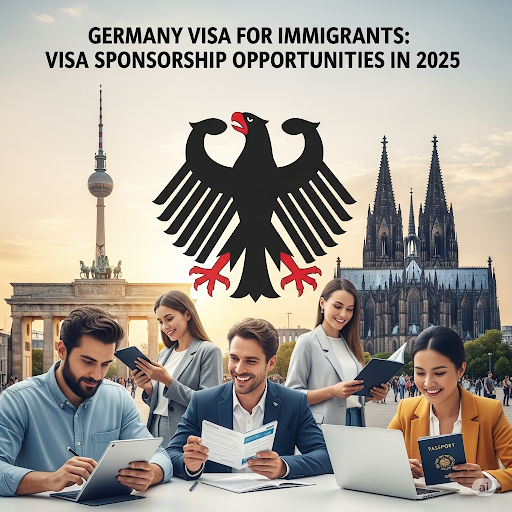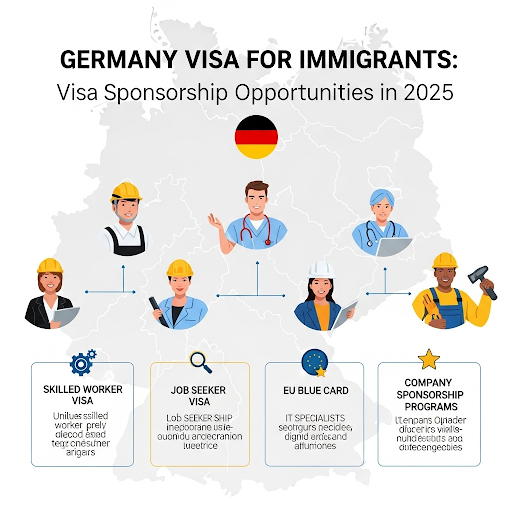In 2025, Germany remains one of the most attractive countries for foreign workers, thanks to its booming economy, structured immigration system, and rising demand for international talent.
With a GDP surpassing €4.5 trillion and an unemployment rate hovering around 6%, Germany is actively addressing a severe labour shortage of over 400,000 positions, according to the Federal Employment Agency (BA).
This shortage, fueled by an aging population and a shrinking local workforce, has led the German government to significantly expand visa sponsorship programs in 2025.
Key immigration pathways such as the EU Blue Card, Skilled Worker Visa, and Opportunity Card (Chancenkarte) are now more accessible than ever, offering job seekers from countries like India, Nigeria, the Philippines, and Pakistan a direct route into Germany’s high-demand sectors.
Whether you’re aiming for a role in engineering, healthcare, IT, skilled trades, or logistics, this guide will walk you through everything you need to know, from salary expectations and visa types to job application strategies, relocation support, and eligibility requirements.
If you’re looking to start a high-paying career abroad with long-term residency options, Germany in 2025 is your opportunity, and this guide is your blueprint for success.
Economic Context and Demand for Immigrants
Germany’s economy, the fourth largest globally, thrives on industries such as manufacturing, automotive, healthcare, IT, and engineering, contributing to its economic resilience.
Despite its prosperity, the country faces a demographic challenge: over 20% of its 84 million residents are above 65, leading to a shrinking labor force.
The BA estimates a need for 400,000 additional workers, a figure expected to rise as retirements outpace new entrants.
This labor gap has spurred the German government to enhance immigration policies, notably through the Skilled Immigration Act (2020, updated 2024) and the introduction of the Opportunity Card, to attract talent from around the world.
The demand spans both skilled and unskilled sectors, with employers offering visa sponsorship to fill critical roles. Incentives like relocation support and, in some cases, housing assistance further encourage immigration.
Germany’s multicultural society, with over 13 million foreign residents (15% of the population), fosters an inclusive environment, supported by a strong social welfare system and high living standards.
This context positions 2025 as an opportune time for immigrants to leverage visa sponsorship for a stable career and life in Germany.
Visa Types with Sponsorship
Germany offers a variety of visa options tailored to different immigrant profiles, with employer or government support facilitating the process. These visas are designed to address labor shortages and integrate immigrants effectively:
Opportunity Card (Chancenkarte)
- Description: A 12-month visa allowing job seekers to explore employment opportunities with trial work (up to 2 weeks) or part-time work (20 hours/week).
- Requirements: 6+ points based on age (e.g., 18-35 = 2 points), experience (2+ years = 2 points), language skills (A1 German or B2 English = 2 points), and €1,027/month financial proof (2025).
- Sponsorship: No job offer needed initially; employers may sponsor post-trial.
- Duration: 12 months, extendable with a job.
Skilled Worker Visa (Section 18a AufenthG)
- Description: For individuals with recognized vocational qualifications or comparable experience.
- Requirements: Job offer, skills equivalent to German vocational training, no salary minimum for non-regulated professions.
- Sponsorship: Employer petitions and covers visa costs (€100).
- Duration: Up to 4 years, renewable, with a path to permanent residency.
EU Blue Card
- Description: For highly qualified professionals earning above €58,400/year (2025), or €45,300 for shortage occupations (e.g., healthcare, IT).
- Requirements: Recognized degree, job contract, A1 German or equivalent language skills.
- Sponsorship: Employers facilitate applications, often with relocation support.
- Duration: 4 years, renewable, with fast-track residency.
Job Seeker Visa
- Description: A 6-month visa for exploring job opportunities.
- Requirements: €5,500 financial proof, professional qualifications, B1 German.
- Sponsorship: Employer support post-job offer.
- Duration: 6 months, extendable with employment.
Family Reunification Visa
- Description: For joining family members (spouse, parents, children) already residing in Germany.
- Requirements: Proof of relationship, sponsor’s income (€1,318/month for spouse, 2025), A1 German for spouses.
- Sponsorship: Family member acts as sponsor.
- Duration: Tied to sponsor’s residence permit.
Student Visa with Work Transition
- Description: Allows study with part-time work (20 hours/week), transitioning to a work visa post-graduation.
- Requirements: University acceptance, €11,208/year blocked account, health insurance.
- Sponsorship: Employers may sponsor post-study.
- Duration: Course length plus 18 months job search.
These visas reflect Germany’s commitment to addressing labor needs, with sponsorship easing financial and bureaucratic hurdles.
Eligible Job Sectors with Sponsorship
Several sectors are prioritizing immigrants due to labor shortages, offering visa sponsorship and, in some cases, additional benefits like housing:
Healthcare
- Roles: Nurses, Caregivers, Medical Assistants
- Salary Range: €25,000 – €50,000 annually
- Demand Drivers: 50,000-worker shortage in elderly care, aging population.
- Sponsorship: Skilled Worker Visa, relocation grants.
Construction
- Roles: Laborers, Carpenters, Electricians
- Salary Range: €25,000 – €50,000 annually
- Demand Drivers: Infrastructure projects and housing boom.
- Sponsorship: Opportunity Card, H-2B equivalent, free housing in rural areas.
IT and Engineering
- Roles: IT Support, Mechanical Engineers
- Salary Range: €40,000 – €70,000 annually
- Demand Drivers: Digital transformation and industrial needs.
- Sponsorship: EU Blue Card, employer support.
Hospitality
- Roles: Waiters, Chefs, Housekeeping
- Salary Range: €20,000 – €35,000 annually
- Demand Drivers: Tourism recovery in Bavaria and Berlin.
- Sponsorship: J-1 visa, seasonal housing.
Agriculture
- Roles: Farmworkers, Harvest Hands
- Salary Range: €20,000 – €35,000 annually
- Demand Drivers: Food production and rural labor gaps.
- Sponsorship: H-2A visa, on-farm housing.
Logistics and Warehousing
- Roles: Warehouse Workers, Drivers
- Salary Range: €25,000 – €45,000 annually
- Demand Drivers: E-commerce growth.
- Sponsorship: Skilled Worker Visa, subsidized housing.
These sectors benefit from government incentives and employer willingness to sponsor, aligning with immigration goals.
Eligibility Criteria
To qualify for visa sponsorship, immigrants must meet specific standards:
- Work Experience: 1-5 years in a relevant field, with flexibility for entry-level roles (6-12 months).
- Education: No degree required for some roles (e.g., laborers); vocational training or a degree for skilled positions.
- Language Skills: Basic German (A1) or English (B2) for most visas, with higher levels (B1/B2) for professional roles.
- Skills and Certifications: Trade-specific skills (e.g., carpentry) or willingness to train; certifications enhance eligibility.
- Age: Typically 18-45, though exceptions exist for experienced workers.
- Health and Character: Medical exams and police clearances are mandatory.
Application Strategies
Securing a sponsored visa requires a proactive approach:
- Research Employers: Target firms like Siemens (engineering), Deutsche Post (logistics), or rural care homes. Use Make it in Germany, Indeed.de, and StepStone.de.
- Prepare Documents: Compile a passport, CV (in German/English), experience proof, language certificates, and a cover letter highlighting skills.
- Network: Attend job fairs, join expat forums (e.g., Toytown Germany), or connect with recruiters on LinkedIn.
- Apply Directly: Submit applications online or in-person, emphasizing flexibility and language willingness. Follow up within a week.
- Seek Support: Engage relocation agencies (€500-€2,000) or the German embassy for visa guidance.
Targeting high-demand sectors and persistent follow-ups enhance success.
Costs and Financial Planning for Visa Applicants
For visa applicants planning to move to Germany in 2025, understanding costs and effective financial planning are crucial to a successful application.
Visa fees vary by type, with short-stay Schengen visas costing €90 and long-stay national (D) visas, such as those for work, study, or family reunification, priced at €75 for adults and €37.50 for minors.
Additional charges may include biometric fees (€500-€1,000 in India) and VFS service fees (€1,000-€2,000, depending on the country), all of which are non-refundable even if the application is rejected.
Financial proof is a key requirement to demonstrate self-sufficiency. The Opportunity Card mandates €1,091 per month (€13,092 annually) as of January 2025, while the student visa requires €11,904 per year (€992/month) in a blocked account, updated in September 2024.
The Freelance Visa requires a minimum of €9,000 annually, or €53,130 for those over 45 without adequate pension proof. Acceptable proof includes a blocked account, bank statements, parental income, or a sponsor’s declaration, though specifics vary by embassy.
- Beyond visa costs, applicants should budget for additional expenses:
- Health insurance: €110-€250/month
- Document translation and certification: €50-€200
- Medical exams: €200-€400
- Legal assistance: €500-€2,000
- Travel costs (flights): €500-€1,000
- Initial housing deposits: €1,000-€2,000
- Student semester fees: €100-€350
- Private university tuition (e.g., Bavaria): €2,000-€20,000/year
Effective financial planning involves starting savings at least three months ahead, using cost-effective transfer services like Wise or Revolut, and monitoring exchange rates. Opening a blocked account early—requiring a one-time deposit plus €50-€100 in bank fees—ensures compliance.
Maintaining organized records of financial documents and consulting the German embassy or Consular Services Portal for country-specific advice can prevent delays. Targeting employer-sponsored roles may also provide relocation support, reducing the overall burden.
Living Conditions
Living costs vary by region. In Munich, rent for a shared apartment averages €1,000/month, while in rural areas like Thuringia, it’s €600. Public transport costs €50-€100/month, and groceries range from €250-€350/month.
Employer-provided housing (common in rural roles) offsets costs, though utilities (€100-€200/month) apply. The healthcare system offers universal coverage (€150-€250/month), with English-speaking options in cities. The multicultural environment, with 13 million foreigners, aids integration, though basic German (A1) is recommended.
Healthcare System Overview
Germany’s healthcare system is a highly regarded dual public-private model, spending 11% of its €4.5 trillion GDP in 2025. It provides universal coverage through statutory health insurance (e.g., AOK) and private options, ensuring access for all residents.
With over 400,000 doctors and 2,000 hospitals, the system offers high-quality care, though a shortage of 35,000 doctors, including pediatricians, persists. Monthly contributions range from €150-€250, with English-speaking services available in urban areas, supporting immigrants’ integration.
Benefits of Visa Sponsorship
- Legal Work Status: Ability to live and work in Germany for the visa duration.
- Financial Support: Some roles offer housing or relocation aid.
- Career Growth: Opportunities to upskill and advance.
- Settlement Potential: Path to permanent residency with 5 years of residence and B1 German.
Challenges and Mitigation
- Language Barrier: Basic German (A1) is often required. Enroll in free courses (e.g., Volkshochschule) or target English-friendly roles.
- Visa Costs: Fees (€75-€600) and legal assistance (€500-€2,000) need savings or employer negotiation.
- Bureaucracy: Complex processes delay applications. Use relocation services.
- Housing Competition: Limited free housing requires early applications to rural employers.
- Job Security: Temporary roles may end. Seek long-term contracts.
Future Outlook
Germany’s labor shortage is projected to grow, with a 5-7% industry increase through 2030. The Opportunity Card and Skilled Immigration Act expansions may raise visa quotas, though language and recognition hurdles could persist. Automation may reduce some manual roles, but skilled and service positions will remain in demand. Monitoring BA updates and industry trends will be essential.
Conclusion: Why 2025 Is the Best Time to Secure Visa Sponsorship Jobs in Germany
Germany’s visa sponsorship programs in 2025 present a powerful gateway for foreign professionals and unskilled workerslabour shortage of over 400,000 jobs spanning critical sectors like healthcare, IT, construction, agriculture, logistics, and hospitality, demand for international talent has never been higher.
Whether you’re applying through the Opportunity Card (Chancenkarte), the EU Blue Card, or the Skilled Worker Visa, Germany offers structured immigration pathways with relocation support, competitive salaries, and a clear route to permanent residency.
By aligning your profile with in-demand roles, using top platforms like Make it in Germany and EURES, and preparing a compelling application, you can stand out in a competitive global market.
Now is the time to take action. Start your research, upgrade your qualifications, and apply for roles that match your experience. Germany is actively hiring in 2025, and with the right steps, you can turn this moment into a life-changing move. Don’t wait—seize your opportunity and start your journey to Germany today.
Frequently Asked Questions (FAQs)
1. Can I immigrate to Germany without a job offer?
Yes, the Opportunity Card allows a 12-month job search with trial work (2 weeks) or part-time work (20 hours/week), requiring 6+ points and €1,027/month financial proof.
2. What jobs in Germany offer visa sponsorship?
Sponsorship is available in healthcare (nurses), construction (laborers), IT (support), hospitality (waiters), agriculture (farmworkers), and logistics (warehouse workers), driven by labor shortages.
3. Do I need to speak German to get a visa?
Basic German (A1) or English (B2) is often required, with higher levels (B1/B2) for skilled roles. Some employers provide language training.
4. How long does the visa process take?
The Opportunity Card takes 2-4 months, Skilled Worker Visa 3-6 months, EU Blue Card 2-3 months, and Job Seeker Visa 1-2 months, depending on documentation.
5. Can I bring my family with me?
Yes, dependents (spouse, children under 18) can apply for family reunification visas, but they cannot work unless authorized. Fees (€100 per dependent) apply.
6. What is the minimum salary for a sponsored visa?
No minimum for non-regulated roles under the Skilled Worker Visa, but €12.41/hour (2025 statutory wage) is typical. EU Blue Card requires €45,300/year for shortage occupations.
7. Do I need qualifications to get a sponsored job?
Qualifications vary: no degree for laborers, vocational training or experience for trades, and a degree for skilled roles (e.g., IT, healthcare).
8. What are the costs involved?
Costs include visa fees (€75-€100), employer petitions (€200-€600), medical exams (€200-€400), and optional legal fees (€500-€2,000).
9. Can I stay permanently after getting a visa?
Yes, after 5 years with a residence permit and B1 German, you can apply for a settlement permit, subject to job continuity.
10. What if my qualifications are from another country?
Overseas qualifications need recognition (e.g., ZAB, €200-€300) and may require additional training, with employers often supporting the process.
11. Are there age restrictions?
No strict upper limit, but 18-45 is typical for visa programs. Physical fitness is assumed for manual roles.
12. How can I find employers offering visa sponsorship?
Target firms like Siemens, Deutsche Post, or rural care homes via Make it in Germany, Indeed.de, or relocation agencies. Attend job fairs.
13. What if my visa application is rejected?
Rejections may stem from insufficient funds or documentation. Appeal within 30 days (€100) or reapply after corrections.
14. What support is available for new immigrants?
The BA offers integration courses (language, culture), and employers may provide housing or relocation aid.
15. How does the labor shortage affect my chances?
The 400,000+ worker shortage increases employer willingness to sponsor visas, especially in shortage occupations, though competition for spots exists.
These FAQs clarify the immigration process, empowering candidates to pursue opportunities in Germany effectively.






